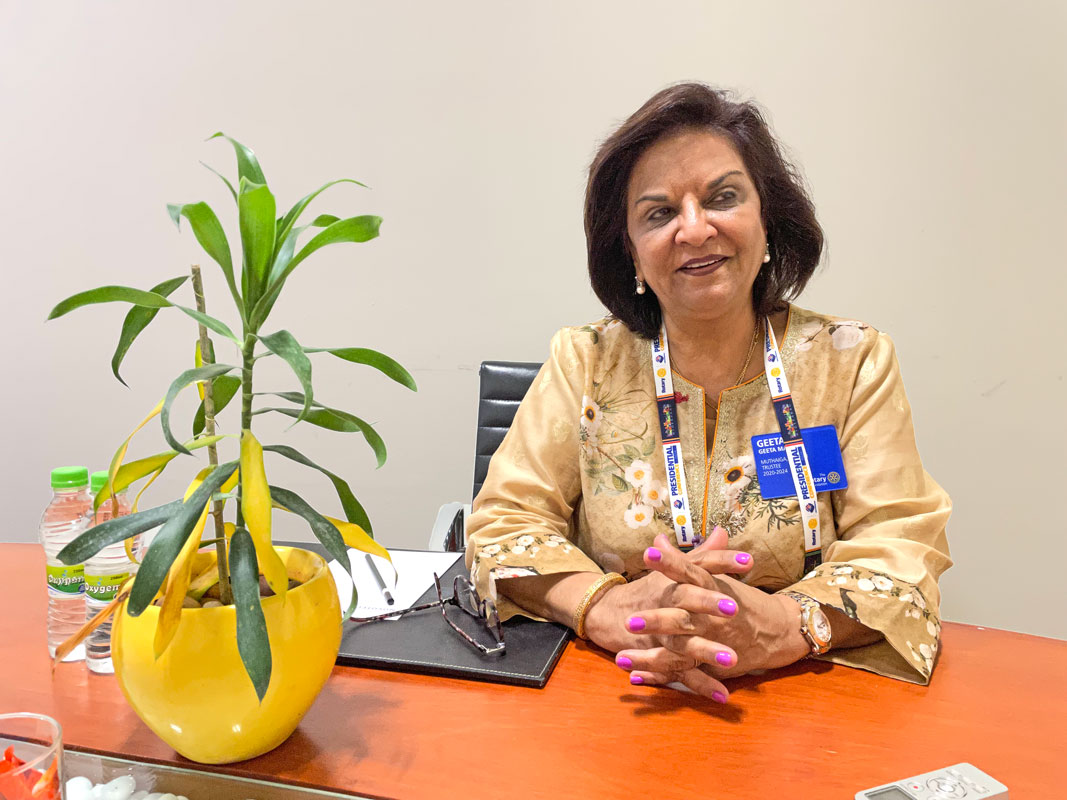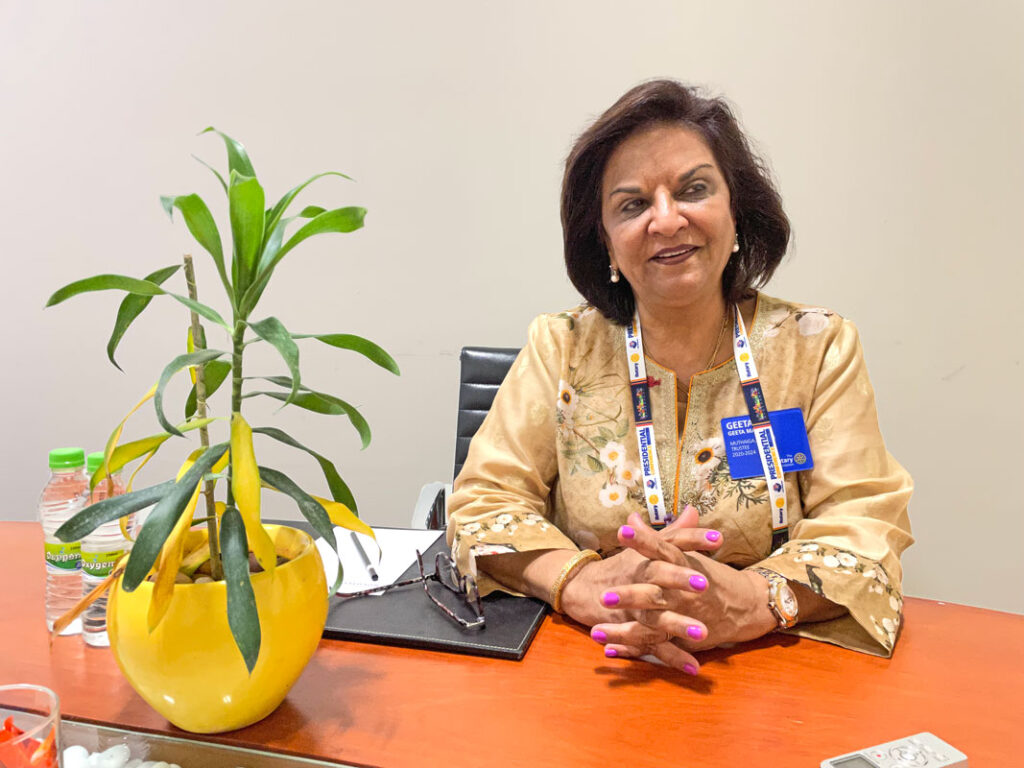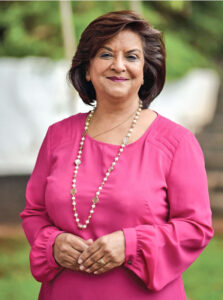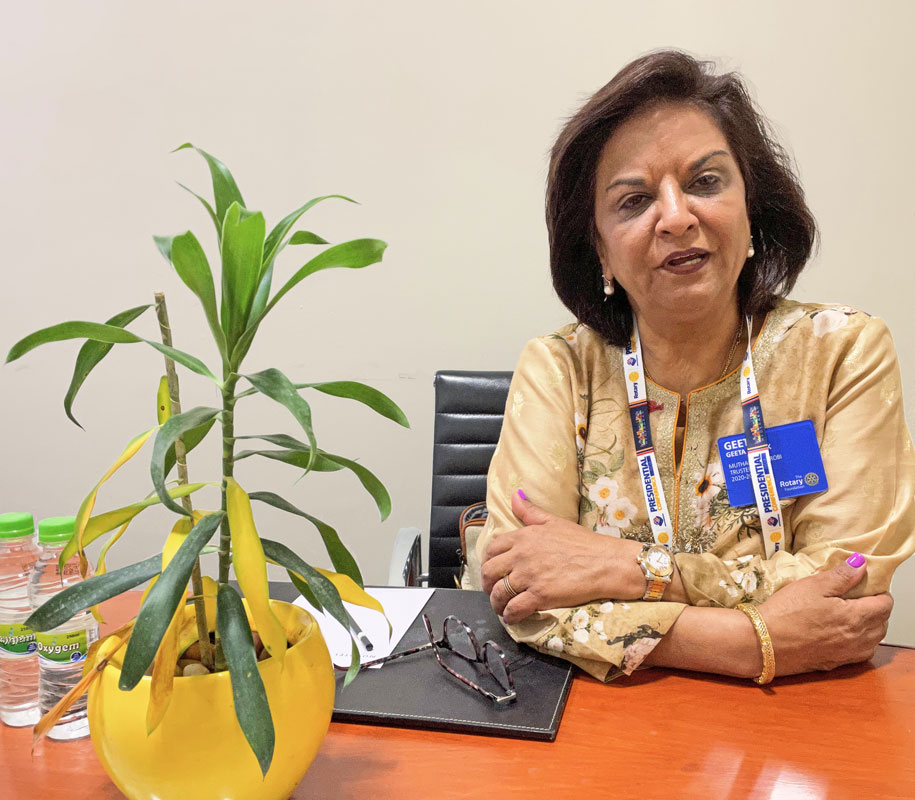
TRF Trustee Geeta Manek, who has served as governor in RI District 9212, Africa, has stars in her eyes when she talks about Rotary in India, particularly the TEACH programme, and the mega service projects that Indian Rotarians do. In an interview to Rotary News at the presidential conference in Hyderabad, she said the entire Rotary world was looking up to Rotarians in India, and Africa is trying to emulate India’s example in membership growth and mega, sustainable projects.Excerpts: …
How did you begin your Rotary journey?
If I tell you that, you will laugh! My husband was part of a group that was chartering a club and going every Monday evening without fail to the meetings… he just dropped everything and simply ran. I was very curious and wanted to know why. I had never heard of Rotary and he was so keen to never miss a meeting, that it seemed funny… it filled me with a bit of curiosity, a little suspicion, and even worry.
Which year was that?
That was 1996; one day I asked him can I join you and he said not today but we’re soon having a ladies’ evening and you can join us. So I went that day and the rest is history.
Even today though my family has left that village 40 years ago, we have our roots there… no matter how high we fly, we know we come from there.
After that the charter president of the club invited me to join, I did and never looked back.
Tell us a little about your background in Kenya, were you always in Nairobi? And when did your family migrate there?
I was born and grew up in a village in Kenya; my great grandfather went there first. Just as in India, our villages lacked a lot of facilities. In the village school, we had one big room and all the children sat on the mats, and we had just one teacher for the whole school. He was the most respected man in the community.
So did you study in that school?
Yes, I did, for three years and then my father thought I was getting too big for my boots and sent me to the city boarding school, where I learnt English. After finishing there, I went to England for high school and eventually graduated in business administration and marketing.
What was your family business like?
My father was like a general merchant in the village. He was a supplier to the big people who had settled there and whatever they needed, he would rush to the city and bring it. Now my husband and I are in real estate, hospitality, insurance… we have a group of companies. I am a director in the real estate company.
So as part of service to your village what did you and your family do to change things?
First of all, we made sure that it got access to water. It is located in the highlands and there was a natural waterfalls nearby, but people didn’t have access to piped water supply to households. We ensured that water was provided, as well as job opportunities. We did a vocational training project in our village. We worked in education… the children sat on the floor, so we ensured that desks were provided, teachers were trained, and resources provided for books and upgrading the curriculum. Even today, though my family has left that village 40 years ago, we still have our roots there… no matter how high we fly, we know we come from there. We are grounded.
What are your views about Rotary in India and how did you first connect with the Rotarians here?
Oh, the Rotarians of India are great, they are so dedicated, so inspiring, so determined, whatever they want, they aim for it, work for it and get it. Rotary in India is fabulous because it is growing in a big way, and doing so much work. Ten years ago, access to clean water was a big challenge in so many areas. Now Rotarians are ensuring that people get access to clean water in so many places in India.
The work they do in education with the TEACH programme is so inspiring. India was once a recipient of so many different kinds of aid, but now the Rotarians of India are ensuring that the reverse is happening. They are doing so many projects in Africa, and even America… particularly on the US-Mexico border.
Rotarians of India have taken Rotary to another scale when it comes to membership growth, giving to the Foundation, and receiving from it to do grand projects on such a mega scale by forging great partnerships. What I see as an outsider is that the rest of the Rotary world wants to do as India does… because of the connections and partnerships you have built, the collaborations you have made, with big and reputable corporates like the Tatas, the GoI, and others. Thanks to the TEACH programme, people in different states have speed dial to the leaders, so hopefully we too will get there.
How did you first connect with President Shekhar Mehta and the TEACH programme?
He was a director when my husband was training to be governor. And over the years, we kept in touch. We have a lot of strong connections with India, but we don’t have a family here. Our family moved out of India nearly 200 years ago, so every time I look at an Indian, I am just mesmerised.
So Rotary in India is your family?
Exactly. And President Shekhar and Rashi are very close to us; it was inevitable they had to come to Africa this year and they spent a lot of time here. He has a special place in his heart for Africa, as he knows its true potential.
He believes it is the next growth area in Rotary.
Of course it is going to be the next frontier of Rotary. We borrowed a lot from the polio eradication practices from India. And were fortunate enough to achieve that milestone in Africa, during the hardest period of the Covid pandemic. In Africa RI has developed a peace programme with the Makerere University. And the next one will come up either somewhere in North Africa or the Middle East.
And peace centres are required now more than ever, with the Ukraine conflict raging now.
Yes, and peace is also connected with poverty. Most of our conflicts come because of lack of resources.
There is so much of violence and conflict in African countries…
Yes, that is because we are simple, poor people with no access to resources. So if somebody has two cows, you want to grab one, more because of survival and not because people are bad or greedy. The instinct is to get something they don’t have. But Rotary in Africa is making big strides.
How many Rotary members are there in Africa.
Only 42,000! And we are one billion people, so it is not enough. For eg, in India you have more than 1 billion people but you have at least 160,000 Rotarians.
So you can at least aspire for that number. So what kind of a membership drive is there in Africa?
We are striving to attract people to join Rotary by chartering corporate clubs, going out to the community, seeing on maps where there is no Rotary and how we must try and get a club there. So there is a purpose.
How difficult was your journey to this leadership position… of a TRF Trustee… you are a woman and few women have reached such high levels in Rotary.
I am not the first woman trustee…
But from Africa you are!
Yes, from Africa, and the first woman of Indian descent! (smiles).
So was that a difficult journey?
Quite honestly, no, because though I’ve worked very hard, I’ve enjoyed so much what I was doing that it didn’t seem hard to me at all.
I participated in all areas of the club and the district. I was invited to join a committee and maybe they realised there that I have some potential.
I don’t know how I was identified… but yes, I was very active in Rotary.
The other thing is that I’m unable to say ‘No’ to people, so I try to make sure that I am available when some work is required from me.
What do you think about the future of women in Rotary?
Oh, that will be amazing, because every door here is open for us. We are purposefully and deliberately ensuring that once the glass ceiling was broken, every opportunity became available to women in Rotary. And with diversity, equity and inclusion being a major part of our focus, we want to ensure that everybody is included.
And women are known as traditional caretakers and caregivers and in the corporate world, women are going places. And now with incoming president Jennifer Jones, there is going to be no limit, it’s all about merit, outcomes and delivering results.
Do you aspire for the top post?
(Laughs) No chance! Because the pathway to becoming a president is that you have to become a director first, which is an elected position and I have never liked elections, because somebody always wins and somebody always loses.
So you’ve never contested an election, even to become DG?
Never; I was made DG through a unanimous decision; I did not contest an election.
What do you enjoy the most about Rotary
Every evening I go to bed very comfortably because I know I have touched a life, even if it is only to make somebody smile. Or just giving a hand to an elderly person to walk one step down. Honestly, I feel that when I am giving a hand to somebody I am bending down to lift somebody up. That is the magic of Rotary.
How do you see the future of Rotary? The membership has been static for so long; is Rotary changing at all to address
this issue?
Perhaps not changing fast enough, but it is certainly changing and Rotary is adapting and focused on membership not because there is anything for Rotary to gain by a higher membership. But because Rotary has so much relevance in the world today, where there is so much strife and conflict, lack of resources, etc. As Gandhiji said there is enough in this world for everyone’s need but not greed.
So if we tone down the greed a bit, there is enough to make it an equitable world.








